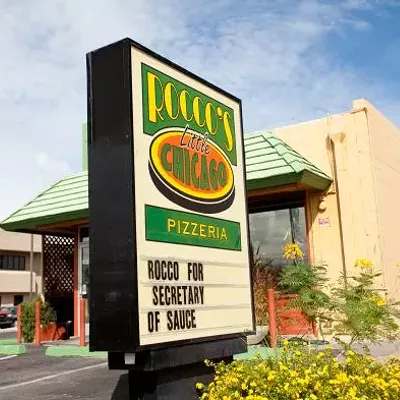Easier said than done. It's hard enough to make it day-to-day on a maquiladora (assembly plant) salary, much less put away savings. So he settled down. Two years after coming to Nogales, he fell in love and started a family.
Married 12 years now, Luis and Juanita rent a 600-square-foot concrete block home in Colonia Colosia. Luis works six days a week for 10 hours a day, making about $90-$100 a week. That's good money for a maquila worker, but not enough to support a family of four. His wife, who has also worked in the maquila, sells jewelry and helps organizing efforts for La Coalicion para la Justicia en las Maquiladoras, a nonprofit that educates workers about their rights under Mexican labor laws.
They can't afford to buy a home--even if there were homes to buy. They have electricity, but no running water. Like most residents, they get water from city water trucks that bounce up the shambled dirt roads cut into the hills.
Out of their tiny monthly budget, they have to pay for food, electricity and water, as well as gas and other costs associated with their mid-'80s minivan--a luxury--and school for their kids, ages 10 and 6.
Food consumes about 40 percent of their budget. Francisco Trujillo, the director of the Nogales Chamber of Commerce from 1995-2001, says that 60 percent is typical for residents of Nogales. They buy most of their food across the border in Nogales, Arizona, because it's much cheaper. A gallon of milk on the U.S. side of the border, for example, costs $1.70, while it's $3 in Sonora; a kilo of meat is about $3 in the United States and $5 in Sonora--this according to a recent breadbasket survey by Borderlinks Organization, a nonprofit that takes U.S. citizens on tours to give them a firsthand look at what it is like to live and work in Nogales.
Why does food cost so much south of the border? Much of it is imported because Mexico doesn't grow enough of its own. The country exports a large amount of raw goods, including food, to the United States, then imports processed foods, cereals, wheat, meat and powdered milk back into the country. Gustavo Castro Soto, the director of a Mexican thinktank, the Center of Economic and Political Investigation of Community Action, based in Chiapas, predicts that by 2006, Mexico will be importing more than 70 percent of its food. Currently, 85 percent of rice is imported, as is 49 percent of wheat and nearly all soybeans.
It's just too hard to compete against cheaper crops from countries like the United States that subsidize farmers (a situation worsened by NAFTA). And shipping anything across Mexico is atrociously expensive. Gasoline is three times higher in some parts of Mexico than in the United States. Insurance premiums are high, and it costs more in toll fees to drive from Nogales to Mexico City than it does to pay for gas, points out Trujillo.
NAFTA, which went into effect in 1994, has also affected imports, exports and prices. The price of a basic food basket increased 370 percent from 1994 to 2000, according to the Mexican Association for Studies in the Defense of the Consumer. Meanwhile, Mexican wages along the border fell from 97 cents an hour in 1990 to 71 cents an hour in 2000.
Despite the harsh economic plight, Luis and Juanita aren't complaining. They're a good-natured family. They joke a lot. Juanita naturally reaches out to help others understand their rights and stick up for themselves.
Unrelated to her job, she's been one of the main organizers of workshops to improve homemaking skills, like a recent soap-making class. She greets acquaintances enthusiastically and willingly shares stories from her day and asks about theirs. She jokes about such things as Nogales' roads and the flat tire the minivan had the day before.
She is certainly right on about Nogales' roads. The haphazard roads are narrow, curvy, rutted corridors that run up and down the hills. You accelerate to climb a steep hill, then brake for deep ruts that cut diagonally all the way across the road, then accelerate, then brake, and so on.
Although Luis and Juanita don't complain, they want the maquilas to pay a realistic living wage and obey Mexican laws. Juanita started working for workers' rights when she and her husband struggled to make it in Nogales while working for maquilas.
She worked in maquilas for a few years in the early 1990s. At one place, she worked only three days. A chemical powder stuck on the workers' fingers and made them itch. The powder migrated by touch to other parts of their bodies. The maquila doctor's advice was to wash it with water, which didn't relieve the problem.
She quit another maquila because it paid her the low new-worker-wage of $28 per week, then charged $15 a week for childcare.
"Es trabajo muy duro," she says.
It's hard work.
LEANDRA RAMON MERCELES is a friend of Juanita. Like many of Nogales. Sonora's estimated 350,000 residents, she worked in the maquiladoras at one time.
No more. They won't hire her at the age of 42.
Five years ago, the maquiladoras couldn't be so selective, but now, workers outnumber jobs because the plants are closing down. There were 110 maquilas employing 45,000 people in Nogales two years ago before the current recession, but now there are 85 to 90 employing 28,000 to 30,000, according to maquila association. When demand in the U.S. economy slumps, the Mexican economy slumps too, particularly the maquiladoras, which assemble products for the U.S. economy and consumers.
Leandra's husband and 19-year-old son work in the maquilas to support their family of four. Since she's no longer able to get a job in the maquilas, she campaigns for workers' rights with Juanita and La Coalicion para la Justicia en las Maquiladoras, a group that works throughout Mexico. They not only try to help workers schedule meetings with maquila management to settle disputes, but they also try to--with the help of some counterparts in the United States--educate U.S. workers who lose their jobs to Mexico about the true wage crisis in Mexico. Most of the activities are local and specific to the problems that arise with a specific town's maquiladoras.
The group recently filed a complaint at a maquila that assembles TV remote controls. Workers worked three 12-hour shifts, on Friday, Saturday and Sunday. Management sent around a contract asking workers to work another 12-hour day for the same wage.
Even with a new contract, under Mexican law, the maquila wasn't legally allowed to add another work day to their week and make it 48 hours with no additional money, Leandra explains. La Coalicion members talked with workers and management and arranged a meeting where other complaints were brought up. Finally, management dropped the fourth-day contract.
"It's typical for them to demand more and more work for the same pay," said Leandra in Spanish.
Large organized labor unions are frowned upon by most workers, in part, because the state-sponsored union is a farce, and because historically, unionized workers who fought for rights were fired and blackballed.
Leandra says one ongoing problem is maternity leave. Under Mexican law, women get six weeks off work with pay both before and after birth. Many of the maquilas, she said, don't give this to the mothers. The maquilas require the pregnant women to work, and if they take leave, they're not paid. Many of them are forced to quit.
So the slow, little-by-little, case-by-case struggle continues.
ACROSS THE RUTTED hills of Nogales, Cesar Sanchez Estillo and his family live in a newer colonia sitting on a valley hillside. Located along a treacherous path, Cesar's wood shack is made of scraps and pallets from the maquila where they work.
Cesar started living on the land as a squatter: He chose land that didn't have a home on it and began building, first bringing load after load of soil down into the valley by hand to provide some type of level ground. He used tires to put in a kind of retaining wall into the cliff behind his house, then built a shack. He continues to add to it, putting in garden plants and a shed.
Eventually he settled with the owner of the land and bought it. This is typical in Nogales: First, build a house on a plot of land, then settle with the landowner. Next, get together with neighbors and demand that the city provide services.
Generally, the first service provided is electricity, but even that can take years or even a decade, depending on how well the neighborhood organizes, as well as other factors within the city's inadequate management system.
If the homeowners are lucky, then they get running water and sewage service. But less than 60 percent of Nogales residents have all three services, says Trujillo, the current Mexican director of Borderlinks Organization.
Of the 60 percent of residents who have all three services, only 20 percent get service all the time, according to Trujillo. "Others get water service (for parts of a day), not continuously and consistently," says Trujillo, who lives in one of the older colonias.
The city owns no land and has grown rapidly. The result is chaos. There is no system of development. Nothing is planned. By the time services do come to a neighborhood, houses have been built in haphazard relationships to each other. The city can't build any decent roads or other infrastructure for electricity or water.
"Nogales is a city that has received very little attention by the federal government and has grown to be one of the ugliest cities in Mexico," says Trujillo.
By official figures, Nogales is a city of 180,000, but more comprehensive and accurate surveys put that figure at 350,000. Nogales is the fastest-growing city in Sonora and is one of the 10 fastest-growing in all of Mexico.
The rapid growth, the lack of land and the poor administration of the limited funds that Nogales gets from Mexico City guarantee the housing and utility problem will only get worse. Trujillo says that it would take millions of dollars to bring utilities to the rest of the city. And who will pay? Nogales, Sonora, has a budget that less than 10 percent of its northern neighbor, Nogales, Arizona--and with a population that is 10 times bigger.
His home might not be much, but Cesar is proud to be a landowner. His house, 15 by 20 meters, is made of second-hand wood as well as maquila pallets. It has no lock on the door and is dark on the side away from the door. Beds sit right by the front door, with a small kitchen to the left. They have no running water, but they've run an electrical line down from a neighbor's house in the colonia above them.
Cesar talks about the sense of solidarity in his colonia, which is aptly named Solidaridad.
"When people need help, people help out," he says. They all help build each other's property, pass on used clothing and sometimes celebrate occasions and holidays together.
Cesar and his wife, Alicia Marquez Ramon Hernandez, both work at Acco, an office products company plant. His normal schedule would be from 6 a.m. to 4:30 p.m. Monday through Friday, but he's been working until 8:30 at night because the company needs overtime, and it's a way to earn more money. For 13.5 hours of work, he earns 98 pesos a day, roughly equivalent to $9.80. He just received a wage increase of 7 pesos a day as part of an 8 percent monthly increase built into his contract by Mexican law, because he is training to learn all the machines in the factory. He now knows how to run 12 of the 48 of the machines; by October, he expects to know enough to receive 120 pesos a day.
"Everybody's learning to maintain the machines," Cesar says. "The technical workers who normally fix the machines aren't needed because so many people are learning it. That saves the maquila money. The technical mechanic can earn 400-500 pesos per day."
He's worried about learning the machines too quickly. He's seen other workers forced to quit. After they were through training, the maquila cut their wages so drastically that they had no choice but to look for another job. (If you're fired, by law, you get severance pay. If you quit, you don't.)
His wife is an operator earning 90 pesos a day. She expects to get a 4-peso-a-day bonus after Christmas. She works the second shift, 4:30 p.m. to 1 a.m. so that somebody can be around with the kids, ages 14 and 12.
After four years of living and working in Nogales, they were recently able to bring their 12-year-old daughter to live with them. She had been living at Cesar's parents' house in Merelos, 60 miles south of Mexico City. It was cheaper for her to live there, as long as Cesar sent 200 to 250 pesos a month, and she was fearful of moving to Nogales. Their 9-year-old daughter is still living in Merelos with his parents.
Right now, Acco provides free transportation to Nuevo Parque, the newest maquila park in the city, a 20-minute ride away. They could take that benefit away at any time, Cesar says.
"Life on this side of the border is very, very difficult," Cesar says in Spanish. Food costs the family 400-450 pesos a week and electricity runs another 150 pesos. Each month, they send 200-250 pesos to Cesar's parents to care for their daughter, and two kids in school costs about 100 pesos a month. Anything leftover goes to clothes and other items.
They certainly couldn't make it on one salary.
He's concerned about the possibility of his factory closing down because labor costs are even cheaper in Asia. In China, Cesar says, the companies pay the government, which pays the workers about $7 to $8 a week--less than one-tenth the $80 to $100 a week that maquiladora workers make.
"The simple work is all leaving," Cesar says. "Workers must become skilled for companies to stay."
But then, Cesar repeats, he can't learn too many machines too quickly, because when he's through with training, management can force him to accept a lower salary if he wants to keep his job.
He says that people are coming to the border from central Mexico because the economic situation is even worse there. "There just aren't many sources of income in central Mexico," he says.
Some of the people come with the intention of crossing in the United States but end up staying in Nogales, while others come for the work.
Cesar tried both. He met his wife when he was working in Veracruz, the state east of Mexico City. He needed a better job, so five years ago, he crossed illegally into the States and worked as fruit picker in California and at a furniture factory in Phoenix. Then he came back to Nogales and moved his wife and son.
The jobs the undocumented workers take are jobs that nobody wants, he says.
"Nobody's coming with bad intentions," Cesar says. "They just want a better life."
THESE FAMILIES ARE reasonably well off by Nogales, Sonora, standards. Mexican minimum wage is $4.25 a day, or less than 41 pesos. The average starting wage in the maquilas is close to $6 a day in Nogales.
Trujillo says that in general, the maquilas are good. They provide opportunity for workers to have jobs and educate engineers coming out of the Mexican schools.
"If we ever have Mexican industry, we will have the engineers to run it," he says.
But the wages remain too low. "Nothing justifies paying less than three times minimum wage," he says. "They can pay three times minimum wage and still make a profit."
"So people come to Nogales to find a job," Trujillo says. "They have no place to live. They get pallets from their maquila and build a shack wherever they can. They may begin buying some furniture, then bring their families. None of these families qualify for subsidized housing. You have to make three times the minimum wage, and most make 1.5 to two times minimum wage. If maquilas would make a small effort to pay enough to qualify for housing, it would help out conditions a lot."









